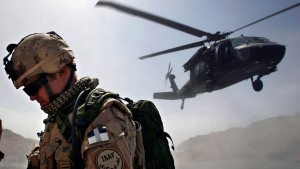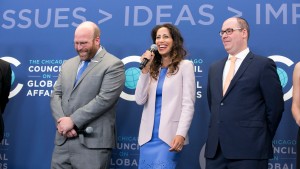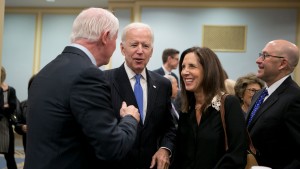Lorem ipsum dolor sit amet, consectetur adipiscing elit. Vestibulum vel malesuada consectetur quis at sodales euismod nullam.
Lorem ipsum dolor sit amet, consectetur adipiscing elit ut aliquam, purus sit amet luctus venenatis, lectus magna fringilla urna, porttitor rhoncus dolor purus non enim praesent elementum facilisis leo, vel fringilla est ullamcorper eget nulla facilisi etiam dignissim diam quis enim lobortis scelerisque fermentum dui faucibus in ornare quam viverra orci sagittis eu volutpat odio facilisis.
1922-1939 Isolationism and the Great Debate



Should the United States stand aloof, leaving the Europeans and Asians to sort out their own problems, or should this country come to the aid, with money and arms if not men, of Britain and the European democracies?
When the Chicago Council on Global Affairs was founded in 1922, it was a worldly outpost in a city and a Midwest dominated by isolationism. It was a turbulent time. Post-Versailles resentments were already building toward the next war. Tsarist Russia had become communist. Italy soon would be fascist. Hyperinflation wracked Germany. Mahatma Gandhi pressed for Indian independence. But Chicago, resolutely midcontinental, stood aloof, geographically and intellectually, from this turmoil. Rowing against this tide, a small group of internationally minded Chicagoans established the Council – then called the Chicago Council on Foreign Relations – “to promote general public interest in the foreign policy of the United States” by bringing in expert speakers to lecture on the events of the world.









At its birth, the Council was an alliance between North Shore grandees and the international experts of the University of Chicago. By the 1930s, this remote and elitist approach gave way to the great debate over American participation in the coming war. The Council stood at the center of this debate. Its programs drew thousands of persons to hear interventionists, isolationists and even outright Nazis. Its radio broadcasts brought this debate to hundreds of thousands of listeners around the Midwest. Behind the scenes, Council leaders led the campaign in the Midwest to give aid to European allies. When the war came, the region sent its leaders to Washington and its sons to fight, and turned its industry into the arsenal that won the victory. For this, the Council could take a bow.
In summary:
Sed ut perspiciatis unde omnis iste natus error sit voluptatem accusantium doloremque laudantium, totam rem aperiam, eaque ipsa quae ab illo inventore veritatis et quasi architecto:
- Lorem ipsum dolor sit amet, consectetur adipiscing elit.
- Ab illo inventore veritatis et quasi architecto.
- Consectetur adipiscinged augue lacus
- Dignissim diam quis enim lobortis scelerisque fermentum dui faucibus in.
Continue exploring this era.
1922
Secretary of State Edward Stettinius speaks on upcoming San Francisco conference forming the United Nations

1923
Explore full timeline
1922
-
Feb. 22, 1922 -
Secretary of State Edward Stettinius speaks on upcoming San Francisco conference forming the United Nations
-
-
Nov 28, 1922 -Lauren Ipsum speaks to 5,000 people in council program at Chicago’s Auditorium Theater.

1923
-
1923 -Council offices move to Marquette Building.
-
1923 -World War II ends.
-
1923 -Secretary of State Edward Stettinius speaks on upcoming San Francisco conference forming UN.
-
1923 -Melvin Brorby joins Council’s executive committee.
1945-1955 Post World War Two



The end of World War II presented the world with one of history’s great blank slates. The atomic age had begun but no one knew how to survive it. Much of Europe and Asia lay in ruins
The Communists moved to control China. The Soviet Union, so recently an ally, loomed as a lethal foe. The United States was the only intact world power but was deeply divided on how to use that power. Outposts of isolationism remained, led by the Council’s perennial sparring partner, the Chicago Tribune. But the Council focused on how, not whether, to build this new postwar world.


Council leaders, especially its former president Adlai Stevenson, helped create the United Nations. As the Kremlin took control of half of Europe, Council speakers proclaimed the dawn of the Cold War and debated America’s new policy of containment. Secretary of State George Marshall came to explain why his Marshall Plan was vital to America’s own security. Indian Premier Jawaharlal Nehru said the great driving force in Asia was nationalism. Eleanor Roosevelt called for a foreign policy based on human rights. Abroad, Russia became a nuclear power and the long slog of the Cold War set in. The Korean War, the first inconclusive war, ended in stalemate. At home, isolationism gave way to a new view of the United States as the defender of the free world, a sort of global policeman, with an indiscriminate foreign policy that would lead to involvement in a faraway place called Vietnam.
This is truly the first global or planetary war in human history…It is an ideological war, international in scope. The idea is whether free men can live in certain ways in all portions of the planet, or whether they cannot.”.
Related Media
 Play Video
Play Video
 Play Video
Play Video
In Summary:
Sed ut perspiciatis unde omnis iste natus error sit voluptatem accusantium doloremque laudantium, totam rem aperiam, eaque ipsa quae ab illo inventore veritatis et quasi architecto:
- Lorem ipsum dolor sit amet, consectetur adipiscing elit.
- Ab illo inventore veritatis et quasi architecto.
- Consectetur adipiscinged augue lacus
Continue exploring this era.
1945


1946



Explore full timeline
1945
-
1945 -World War II ends.
-
1945 -Council absorbs the Speakers Bureau
-
1945 -Secretary of State Edward Stettinius speaks on upcoming San Francisco conference forming UN.

-
1945 -Melvin Brorby joins Council’s executive committee.

1946
-
1946 -Lorem ipsum dolor sit amet, consectetur adipiscing elit.

-
1946 -Lorem ipsum dolor sit amet, consectetur adipiscing elit.

-
1946 -Lorem ipsum dolor sit amet, consectetur adipiscing elit.

1964-1975 The Vietnam Conflict



The Vietnam War dominated world diplomacy, domestic politics, the streets of America, and the tenor of the Council itself. In the summer of 1968, the debate over the war exploded at the Democratic national convention right at the Council’s front door.
Since World War II, Americans had swung from isolationism to a messianic self-image that led to Vietnam. At the start, Council speakers defended the war. But soon, they were questioning whether even the mighty United States had limits that must be obeyed. Some said the domino theory demanded an American victory. Others called the war “illegal, immoral, un-American, un-winnable.” Two leading political scientists, the interventionist Zbigniew Brzezinski and the realist Hans Morgenthau, staged a titanic debate on America’s proper place in the world. By 1966, seven years before the war ended, in a poll at a Council meeting, more than two thousand members opposed U.S. policy in Vietnam and overwhelmingly called for negotiations to end the war.
Council Speakers in the Seventies






As the war wound down, the mood of a chastened nation shifted to restraint, so much so that the Council found it necessary to hold programs on neo-isolationism. The new watchword became not isolationism but interdependence. Economic issues – oil, trade, the new power of multinational corporations – replaced military rivalries on the spearpoint of American diplomacy. A newly assertive Japan joined America on the winners’ podium in the global economy. Council speakers began speculating whether, after forty Cold War years, the Soviet threat might finally be crumbling.
In summary:
Sed ut perspiciatis unde omnis iste natus error sit voluptatem accusantium doloremque laudantium, totam rem aperiam, eaque ipsa quae ab illo inventore veritatis et quasi architecto:
- Lorem ipsum dolor sit amet, consectetur adipiscing elit.
- Ab illo inventore veritatis et quasi architecto.
- Consectetur adipiscinged augue lacus
- Dignissim diam quis enim lobortis scelerisque fermentum dui faucibus in.
Continue exploring this era.
1965

1966
1967
Explore full timeline
1965
-
1965 -Hans Morgenthau and Zbigniew Brzezinski debate American foreign policy.

-
1965 -Garrick Utley gives Council speech, questions U.S. policy in Vietnam.
1966
-
1965 -Poll of Council audiences shows majority oppose U.S. policy in Vietnam.
1967
-
1967 -Council begins hiring staff with professional foreign experience.
-
1968 -Sed ut perspiciatis unde omnis iste natus error sit voluptatem accusantium doloremque laudantium, totam rem aperiam, eaque ipsa quae ab illo inventore veritatis et quasi architecto:
1991-2001 The End of the Cold War



For the first time since the end of World War II, the United States faced a clean state. The Cold War was over and the Soviet Union gone, not only vanquished but vanished. The U.S. ruled as the sole hegemon. Capitalism and liberal democracy had won.
After World War II, the U.S. created a structure that guided policy for forty years. Now, it tried to do the same but, lacking a single foe, dithered. It was a busy decade, what with the Yugoslav wars, Somalia, Rwanda, the rise of China, mostly the arrival of globalization.
 Play Video
Play Video
The Chicago Council too struggled to find a place. The Cold War had focused all it had done; now, there were many issues but no central theme. Titans – Mikhail Gorbachev, Boris Yeltsin, Helmut Kohl, Margaret Thatcher, Henry Kissinger – crossed the Council stage. Colin Powell argued that “the obligation of leadership is ours.” But how to use it? Speakers worried that instant communications -- ”the CNN effect” – distorted any well-planned foreign policies. Chicago itself had changed. Once a brawny but isolated industrial powerhouse, it had become a global city, a hub of globalization, with a different role in the world. To thrive, it needed to understand this role and it was up to the Council to lead this thinking.
In summary:
Sed ut perspiciatis unde omnis iste natus error sit voluptatem accusantium doloremque laudantium, totam rem aperiam, eaque ipsa quae ab illo inventore veritatis et quasi architecto:
- LLorem ipsum dolor sit amet, consectetur adipiscing elit.
- Ab illo inventore veritatis et quasi architecto.
- Consectetur adipiscinged augue lacus
- Dignissim diam quis enim lobortis scelerisque fermentum dui faucibus in.
- Sagittis eu volutpat odio facilisis mauris sit amet massa vitae tortor condimentum.
- Elementum facilisis leo, vel fringilla est ullamcorper eget nulla facilisi.
- Lorem ipsum dolor sit amet, consectetur adipiscing elit ut aliquam, purus sit amet luctus venenatis, lectus magna fringilla urna, porttitor rhoncus dolor purus non enim praesent elementum facilisis leo.
Continue exploring this era.
1991

1992
Explore full timeline
1991
-

-
1991 -Former British Prime minister Margaret Thatcher speaks to the Council.
1992
-
1992 -Former Soviet President Mikhail Gorbachev speaks to the Council.
-
1992 -In 1990s, Chicago becomes a global city.
-
1992 -Lorem ipsum dolor sit amet, consectetur adipiscing elit.
-
1992 -Lorem ipsum dolor sit amet, consectetur adipiscing elit.
2001-2011 War on Terrorism



If, at the century’s turn, the U.S. lacked an enemy and the Council lacked a focus, both were remedied, for better or worse, on 9/11, with the al Qaeda attacks on the World Trade Center and the Pentagon. The U.S. declared war on terrorism and quickly became mired in the twin quagmires of Iraq and Afghanistan.
The Council’s traditional focus on Europe shifted overnight to the Mideast, to Islam and terrorism and global inequities. The Council’s focus migrated in time to China, to the rise of Third World countries, to globalization and, later, to populism. Washington remained fixated on terrorism and the need for U.S. dominance. In Chicago, the Council probed a globalized world, with work on issues – trade, immigration, climate change, energy, global cities – that were perhaps visible first in the Midwest before they became national topics.


The Council achieved its goal of becoming a think tank, first with a report on American foreign agriculture policy that became U.S. government policy, then with original work on cities and the global economy. It established a Chicago-Shanghai dialogue and took a Chicago mayor to China.
A Chicagoan became president and tried to extricate the nation from Iraq and Afghanistan. As these wars festered, an ambitious China and a resentful Russia became America’s great rivals. But the inequalities of globalization – or the government’s failure to deal with those inequalities – eroded the public trust in Washington, especially across the post-industrial Midwest, already described in reports by Council authors.
Continue exploring this era.
2001
2002
Explore full timeline
2001
-
Aug 13 -Marshall Bouton becomes Council president.
-
Sept 11 -Al Qaeda attacks World Trade Center and Pentagon.
-
2001 -Most program shift focus on Islam, the Middle east, terrorism and fallout from the 9/11 attacks
2002
-
2002 -The Mid-America Committee becomes part of Council.
-
2002 -Lorem ipsum dolor sit amet, consectetur adipiscing elit.
-
2002 -Lorem ipsum dolor sit amet, consectetur adipiscing elit.
